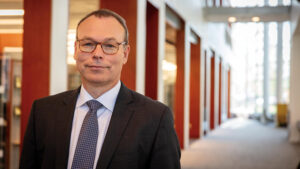Finding strength, passion and leadership in the Vanderbilt mosaic

Ever lose sight of why you wanted to be in health care? Life sometimes gets in the way. Or the storminess of the day to day obscures what fueled your journey and blurs the path forward. After two years of COVID-19, there is plenty of burnout and cynicism to go around. Though we are proving to be highly resilient, few of us are immune.
Yet, continue we must, as people need us now more than ever. They need our care. Both the need and hope are laced within the promise of our discoveries. But just as importantly, they need our character. Our confidence. Our leadership. That “special something” so many of us have drawn from our experiences at Vanderbilt is more important today than ever before.
My passion is rekindled by the unbridled enthusiasm of our trainees — the vast array of students, residents, fellows and postdocs who surround us and are only beginning their decades-long journeys in science and health care. They are fervent despite myriad challenges, not the least of which is pandemic-fueled isolation that impinged on their social and professional lives. We owe them our very best, particularly now.
There is something I find even more sustaining during these difficult times. As I wrote in the VUMC Reporter in January, in periods of stress our relationships matter most. Elegant studies show that relationships are more central to our sustained happiness than just about anything else including money, social class, IQ or even our genes. “Relationship” is a cornerstone of Vanderbilt’s remarkably empathic and caring culture. And today more than ever, our community is finding ways to inspire and engage us — to be in relationship with all of us, despite the sometimes difficult life experiences or circumstances we bring to the table.
CeCe Cihang Gu, a fourth-year medical student, is coordinating an oral history project of the pandemic involving our colleagues. The weight that the front lines carry in the midst of a pandemic exacts a toll many people outside of health care find hard to comprehend. It’s vital to record our experiences, not only to create an archive for the generations that follow, but to enable communication about those experiences today. Through sharing what we see, how we triumph, and also how we grieve, we can strengthen our resilience, allowing us to not only survive, but to thrive.
Throughout the pandemic, our people have continued tackling the most difficult challenges in health care, including those that make relationships challenging. For example, after years of preparation and team building, we are now positioned to answer the elusive questions that plague millions of people worldwide who stutter. To quote Robin Jones, PhD, assistant professor of Hearing and Speech Sciences, “communication is a quintessential aspect of the human experience,” he says. “As a person who stutters, who knows exactly what they want to say but can’t get the words out, that can have a monumental impact on an individual. Whatever we’re able to do to help a person say what they want to say is worth it.”
And through it all, we are working to infuse climate change thinking into our education, training and health system infrastructure. We know the microenvironments in which we live and work impact health, and we’re taking steps to embed the reality of our changing physical world into how we train the next generation.
I hope you will see the stories in this issue of Vanderbilt Medicine as an invitation to build a closer relationship with the vibrant mosaic of interests in our amazing medical center. We are all invited to share in the compelling richness of this passionate work, and in doing so derive sustenance and resilience for the days ahead.
Jeff Balser, MD, PhD
President and CEO, Vanderbilt University Medical Center
Dean, Vanderbilt University School of Medicine
